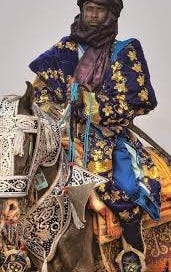Issue #695 Today In Black History, Thursday, August 8, 2024
Did you know you can listen to each “We Are Speaking” post on the Substack App? Download the app!
Help us to reach our August 2024 goals: +250 total new subscribers, including +100 new paid subscribers:
Please share and subscribe to help us grow our publication.
Who are your “Fav Five” who would enjoy “We Are Speaking?” Send them the link!
If you like us, REALLY like us, please click the “Like” button at the end of this post!
We appreciate your support!
When we fight, we WIN!
Today’s Black History WOW!
African history did not start with the slave trade. The Hausa people are one of the largest ethnic groups in Africa, predominantly found in northern Nigeria and southern Niger. Their history dates back several centuries, and Hausa city-states like Kano, Katsina, and Zaria were prominent centers of trade and scholarship in pre-colonial times.
The Hausa Bakwai, or "Seven True Hausa States," are believed to have been established around the 10th century CE. These states developed into vibrant hubs of trade, linking sub-Saharan Africa with the Mediterranean world and the Middle East through trans-Saharan trade routes.
The Hausa language, part of the Afro-Asiatic language family, is one of the most widely spoken languages in Africa. It serves as a vital medium for trade, politics, and culture throughout West Africa. Over the centuries, Hausa culture has been enriched by interactions with other civilizations, including the Arabs, Berbers, and the Fulani.
The traditional music of the Hausa people often features instruments like the kora and goje, accompanied by uniquely rhythmic and melodic structures. Traditional festivals, such as the Durbar, a royal procession held during significant Muslim celebrations, highlight the splendor of Hausa heritage.
Islam was introduced to the Hausa states around the 14th century. Today, the majority of Hausa people are Muslims and Islamic principles are intricately woven into their daily lives, governance, and social norms. The scholarly tradition fostered by Islam has birthed notable figures in various fields, from theology and philosophy to science and literature.
In modern times, the Hausa people continue to play a crucial role in the socio-political and economic spheres of West Africa. They are notably involved in agriculture, commerce, and politics. Cities like Kano and Kaduna remain central to Nigeria's economic activities, with bustling markets and a rich entrepreneurial spirit.
Moreover, the Hausa diaspora has spread its cultural influence across continents, contributing to the global African identity and enriching the multicultural tapestry of many nations.
Today In Black History
In 1796, the Boston African Society was established with forty-four members.
In 1805, Rev. Thomas Paul founded the African Baptist Church in Boston. It is the oldest Black church in Massachusetts.
In 1843, Natal in South Africa was made a British Colony.
In 1885, Black inventor William C. Carter received a patent for an umbrella stand.
In 1893, Clement G. Morgan was admitted to the Massachusetts Bar. He was the first Black person to hold two degrees from Harvard: a Bachelor’s and a Master’s in Law.
In 1925, the Ku Klux Klan held its first national march in Washington, D.C. with about 32,000 marchers.
Our paid subscribers are encouraged to discuss this post in our W.A.S. Chat Community.
Join Pamela Hilliard Owens’s subscriber chat
Available in the Substack app and on the web
You are also welcome to view “We Are Speaking” in Substack Notes. You can also read other Substack publications without subscribing to them when you join Notes.







